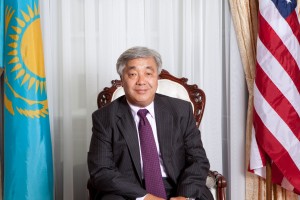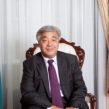
New Kazakh Foreign Minister Vows to Deepen US-Kazakhstan Strategic Partnership
Publication: Eurasia Daily Monitor Volume: 9 Issue: 182
By:

On September 28, Kazakhstan’s President Nursultan Nazarbayev appointed Erlan Idrissov, who had served as ambassador to Washington for five years, as the country’s new foreign minister. Idrissov, 53 and a fluent English-speaker, had previously served as foreign minister between 1999 and 2002, before serving consecutive five-year tours as ambassador to Britain and the United States.
The appointment signals Astana’s desire to sustain strong ties with the United States even as the US military withdraws most of its combat troops from Afghanistan. The success of Kazakhstan’s multi-vector foreign policy requires having Western countries engaged in Central Asia, which otherwise could gravitate toward Russia, China, or a Beijing-Moscow condominium, to the detriment of Kazakhstan’s sovereignty.
Idrissov had developed a reputation as a dynamic Ambassador eager to reach out to influential Americans in Washington and throughout the US. He replaces Yerzhan Kazykhanov, who has served as Kazakhstan’s foreign minister since April 2011 (news.nur.kz, October 5). Kazykhanov, who has been appointed a presidential foreign policy advisor, is a specialist in Arab and UN affairs. He oversaw Kazakhstan’s successful chairmanship of the Organization of Islamic Cooperation, which will end in November 2012.
Kazakhstani political analyst Andrei Chebotaryov said that, "With Kazakhstan participating in the Eurasian Union, this appointment was required to balance foreign policy in a Western direction" (Reuters, September 28). Idrissov can use his extensive knowledge of the West to keep it engaged in Central Asia, despite the withdrawal of NATO combat forces from Afghanistan, which will help balance the increasing regional influence of Russia and China.
In marking Idrissov’s appointment, Nazarbayev’s website noted Kazakhstan’s desire to invest more in Western countries, especially in their high-tech companies (akorda.kz, October 1). Some of the other changes in senior officials that occurred at this time also seem aimed at strengthening Kazakhstan’s economic and technological development (kursiv.kz, October 4).
In accordance with its efforts to diversify its allegiance with major powers, Kazakhstan supports the US economic and defense presence in Central Asia. Washington is equally interested in preserving Kazakhstan’s balanced relationship with the other great powers.
One innovation that occurred during Idrissov’s tenure as ambassador to Washington was the establishment of a bilateral Strategic Partnership Commission on February 1, 2012. Its next session will take place in Astana in 2013. The two countries also hold frequent sessions focused on particular dimensions of the partnership. They will discuss bilateral energy cooperation, including the peaceful use of nuclear energy and alternative energy sources, at the next meeting of the US-Kazakhstan Energy Partnership Commission, scheduled to be held in Washington on October 15-16.
Kazakhstan and the United States established a formal strategic partnership in 2006, but ties have been strong since Kazakhstan became independent in 1991. The US was the first country to recognize Kazakhstan on December 25, 1991. Since then, energy and security issues have been a cornerstone in bilateral relations. The US provided Kazakhstan with considerable financial assistance to eliminate its nuclear warheads, weapons-grade materials, and supporting infrastructure. Relations were strengthened after the intervention in Afghanistan in October 2001. Kazakh leaders immediately proclaimed solidarity with Washington in the fight against international terrorism, while the US reciprocated by increasing its counterterrorist and counternarcotics assistance to Astana.
After a breakfast meeting between Hilary Clinton and Idrisov at the State Department on October 3, the two chief diplomats held a joint press conference during which they emphasized the durability of inter-state cooperation (https://m.state.gov/md198635.htm).
“Over the years of Kazakhstan’s young independence,” Idrisov noted, “our nations have built a relationship which is robust, dynamic, and broad, covering vast areas ranging from nuclear nonproliferation to energy partnership, nation building, and regional security.” Both diplomats vowed to deepen and broaden their partnership in the coming years (Silk Road Newsline, October 4).
Clinton thanked Kazakhstan for the statement of solidarity Kazakhstan had issued on September 13, following the death of American diplomats in Benghazi. “The Ministry of Foreign Affairs of Kazakhstan strongly condemns the act of violence committed in the Libyan city of Benghazi that resulted in the killing of the head of mission and the US embassy personnel,” the statement read. “Kazakhstan calls upon all States to strictly comply with their international obligations to ensure the inviolability of diplomats and diplomatic premises. We also strongly condemn terrorism in all its forms and manifestations, and advocate the adoption of more drastic measures to combat this scourge” (Ministry of Foreign Affairs, September 13).
Clinton highlighted Kazakhstan’s contributions to the international efforts to bring security and economic development to Afghanistan. “As a critical link in the Northern Distribution Network (NDN), Kazakhstan is part of our efforts to supply and support our troops in Afghanistan,” Clinton noted.
The US and its allies have undertaken a sustained effort since 2008 to develop alternative sea, ground, and air transportation routes to Afghanistan’s north, through the territories of the former Soviet Union. The Northern Distribution Network now conveys large quantities of non-lethal supplies from Europe to the NATO troops in Afghanistan through Russia, the Caucasus, and Central Asia. Without the transit routes through Kazakh territory and its cooperation, US efforts to rebuild Afghanistan cannot succeed.
Clinton highlighted Kazakhstan’s support for international efforts to strengthen the Afghan National Security Forces (ANSF). At the May 2012 NATO summit in Chicago, Kazykhanov joined other NATO members and partners in pledging to support ISAF’s training mission for ANSF with money, personnel, and other resources. The effort to train and equip Afghanistan’s National Army and National Police are vital, so that the ANSF can prevent a security vacuum as NATO forces continue to withdraw from Afghanistan.
Clinton noted how Kazakhstan was helping develop the economic infrastructure of Afghanistan and neighboring regions in support of the “US vision for a New Silk Road” of closer economic ties among the countries through expanded mutual trade and investment and people-to-people exchanges.
“Our long-term goal, which is shared by our partners in the West, in the South, to the East, and to the Northeast,” Idrisov responded, is “to turn our space into a genuine platform for cooperation, a genuine space for win-win scenarios.”
This is going to be the major task and biggest challenge for the new Kazakh Minister of Foreign Affairs, who will have to promote regional cooperation among the Central Asian neighbors while seeking to balance the influence of regional powers in order to allow Kazakhstan and the rest of the region to become stronger and determine its own future.




